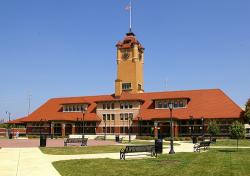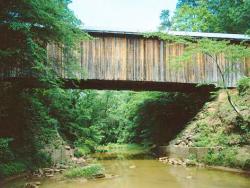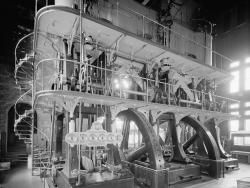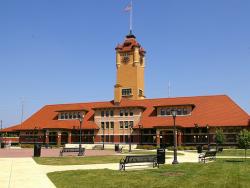In 1894, Dr. John Harvey Kellogg and his brother, Will Keith (W.K.) Kellogg, were making a granola type cereal for their patients in the Battle Creek Sanitarium, a general health facility in Michigan. This granola cereal was made from wheat that was boiled, rolled into a sheet, toasted, and ground. They accidentally left a batch of boiled wheat stand overnight before passing it through the rolls. The individual grains were subsequently pressed into flakes which were toasted to form the first flaked cereal. Two years later, W.K. Kellogg made the first corn flakes.
1894


St. LouisState: MSCountry: USAWebsite: http://www.asce.org/Project/Union-Station/Creator: Link, Theodore , Pegram, George
In the early 1900s, Union Station was the hub of passenger railroad traffic in the central United States. It was one of the first stations to serve as a centralized terminal for multiple railroad lines. It originally served 22 rail lines; 13 from the east and nine from the west.

This machine is an unusual triple-expansion, three-crank rocker engine, which in its day was a high-capacity unit providing outstanding performance for the Boston Water Works Corporation. Designed by Erasmus Darwin Leavitt, Jr. (1836-1916), Engine No. 3 was installed in 1894 to a high-service pumping facility on the south side of the Chestnut Hill Reservoir in Brighton.

In 1894, Catawba County, North Carolina commissioners asked local landowners to build and maintain an 85-foot-long bridge across Lyles Creek. The community hired Andy L. Ramsour, who served as keeper of the Horseford covered bridge over the Catawba River in Hickory, North Carolina.
Innovations

In 1894, Catawba County, North Carolina commissioners asked local landowners to build and maintain an 85-foot-long bridge across Lyles Creek. The community hired Andy L. Ramsour, who served as keeper of the Horseford covered bridge over the Catawba River in Hickory, North Carolina.
…
Read More
This machine is an unusual triple-expansion, three-crank rocker engine, which in its day was a high-capacity unit providing outstanding performance for the Boston Water Works Corporation. Designed by Erasmus Darwin Leavitt, Jr. (1836-1916), Engine No. 3 was installed in 1894 to a high-service…
Read More
In the early 1900s, Union Station was the hub of passenger railroad traffic in the central United States. It was one of the first stations to serve as a centralized terminal for multiple railroad lines. It originally served 22 rail lines; 13 from the east and nine from the west.
The…
Read More
In 1894, Dr. John Harvey Kellogg and his brother, Will Keith (W.K.) Kellogg, were making a granola type cereal for their patients in the Battle Creek Sanitarium, a general health facility in Michigan. This granola cereal was made from wheat that was boiled, rolled into a sheet, toasted,…
Read More


